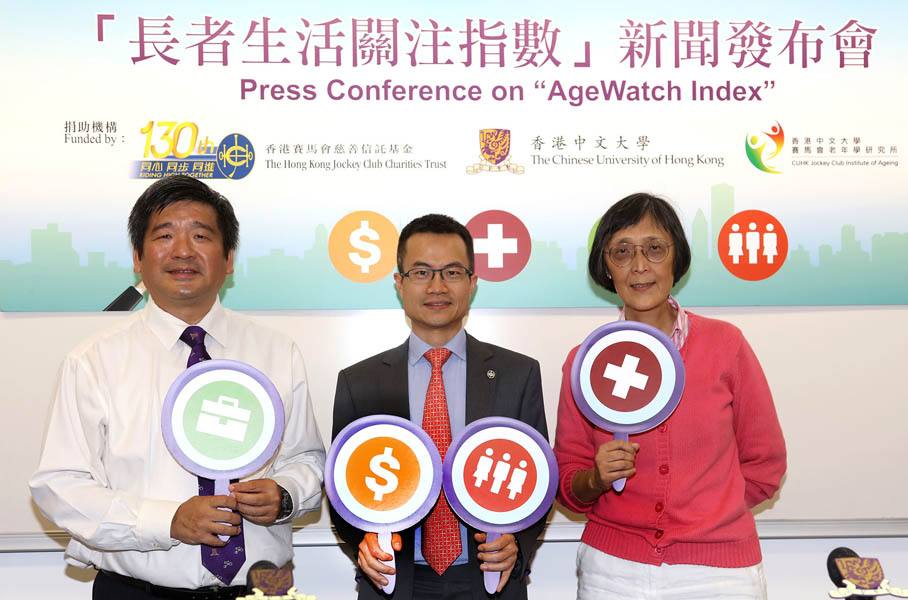
Based on the methods used to calculate the Global AgeWatch Index which measures the wellbeing of older people in the world, The Chinese University of Hong Kong (CUHK) Jockey Club Institute of Ageing, with support from The Hong Kong Jockey Club (HKJC) Charities Trust, revealed that Hong Kong ranked 24th among 97 countries or territories in 2014.
The Index is composed of 13 indicators which can be categorized into four key domains – income security, health status, capability and enabling environment of older people. In terms of these domains, Hong Kong ranked 75th in income security, 9th in health status, 33rd in capability, and 4th in enabling environment.
Commencing in 2013 and updated annually, the Global AgeWatch Index is a multi-dimensional index assessing the social and economic wellbeing of elderly populations in over 90 countries, representing 91% of people aged 60 and above in the world. For the first time the Index enables international comparisons of the quality of life of older people. It also provides a means by which to measure progress in policy responses to ageing.
“With funding support from The HKJC Charities Trust, we are able to rank Hong Kong among 97 countries and regions in the world in the Global AgeWatch Index, which highlights the importance of assessing the wellbeing of our elderly population from a comprehensive and holistic approach. Overall, Hong Kong is performing quite well, particularly in the domains of health status and enabling environment”, Prof. Jean Woo, Director of the CUHK Jockey Club Institute of Ageing commented. “Nevertheless, there is still room for improvement upon examining the results of the indicators. While the elderly population in Hong Kong enjoys longer life expectancy, attention should be given to their psychological and social conditions, reflected in the below-average indicators of their psychological wellbeing and social connectedness.”
The HKJC Executive Director, Charities and Community, Leong Cheung noted that, with Hong Kong facing a rapidly ageing population that is projected to surge to one in three people being 65 or above by 2041according to Government statistics, comprehensive and long-term policies are required to cope with the multi-faceted challenges of our ageing society. “The Club believes the elderly healthcare sector needs to shift towards a more preventative approach by promoting active ageing, which extends healthy years to the elderly, compressing the disability period and improving their quality of life.” The findings help to lay the basis for the Club’s Charities Trust to plan for elderly projects along the theme of building Hong Kong into an age-friendly city, particularly in the areas of “physical and mental wellness,” “employment and volunteering” and “social wellbeing.”
To improve the quality of life of the elderly population in Hong Kong, the CUHK Jockey Club Institute of Ageing will join hands with the Club’s Charities Trust and other stakeholders to implement an Age-friendly City project later this year. The project aims to assess and enhance age-friendliness in Hong Kong. In order to assess trends in the wellbeing of older people in Hong Kong, the Institute will develop a new index – AgeWatch Index for Hong Kong – as an objective measurement for the coming years. The baseline data of the new Index will be available in 2016, using official statistics in Hong Kong and survey data collected this year by the Hong Kong Institute of Asia-Pacific Studies, CUHK.
About CUHK Jockey Club Institute of Ageing
In support of the University’s aspiration to overcome the challenges brought to society by the ageing population, and make Hong Kong an age friendly city in the world, CUHK Jockey Club Institute of Ageing was established in 2014 with the generous support of The Hong Kong Jockey Club Charities Trust. The Institute will synergize research personnel and efforts across disciplines to promote and implement holistic strategies for active ageing through research, policy advice, community outreach and knowledge transfer.